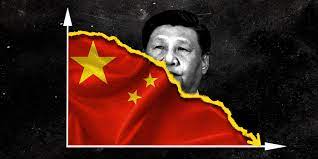
Published January 27, 2024
China slashed its high youth unemployment by nearly a third this month—at least on paper.
However, some experts say the government’s new methodology, which follows a half-year moratorium on publishing this data, does little more than whitewash a systemic problem. One told Newsweek removing students from the sample is what caused the drop.
Though Beijing reported last week it had hit its stated goal of at least 5 percent GDP growth in 2023, the world’s second-largest economy faces major headwinds in the long term. These include an aging workforce, declining foreign investment, a property market slump, and lower global demand for exports.
READ FULL ARTICLE
SOURCE: www.newsweek.com
RELATED: In Hong Kong, decades of wealth gains evaporate on China’s watch
Hong Kong’s stock market is lower today than it was in 1997 when the territory returned to Chinese sovereignty.
 Hong Kong’s stock market has failed to make gains since the territory’s return to China [File: Tyrone Siu/Reuters]
Hong Kong’s stock market has failed to make gains since the territory’s return to China [File: Tyrone Siu/Reuters]
Published January 26, 2024
Taipei, Taiwan – Like many Hong Kongers, accountant Edelweiss Lam spent the last week watching the city’s stock market wipe out 14 months of gains as the Hang Seng Index fell below the psychological threshold of 15,000 points.
It was not the first time Lam, who has been investing on and off in Hong Kong stocks since the late 1990s, had seen it happen.
The index dropped below 15,000 points during SARS in 2003, the Global Financial Crisis in 2008, and zero-COVID lockdowns in 2022.
But while ebbs and flows are part of the investment game, Lam said watching the key measure of Hong Kong’s stock market tumble “back to square one” felt different this time.
“It seems I cannot see the future,” Lam told Al Jazeera by phone from Hong Kong.
The reason, Lam said, is China.
As Beijing increases its control over all aspects of life in Hong Kong, including the economy, and gloom persists about the state of China’s post-pandemic recovery, investors have been voting with their money and looking to other markets.
More than a quarter-century after Hong Kong’s return to China, the Hang Seng is more or less back to where it was during its final days as a British colony.
On Friday, the index hovered below 16,100 points – lower than it was on July 1, 1997, the day of the handover.
Over the same period, stocks in the United States, Japan and other popular markets have flourished.
READ FULL ARTICLE
SOURCE: www.aljazeera.com
RELATED: The world’s most accurate economist has already been proven correct about China this year. Here’s what he says will happen next as the nation continues ‘exporting deflation.’
 Market Securities’ Christophe Barraud is one of the top economic forecasters in the world.
Market Securities’ Christophe Barraud is one of the top economic forecasters in the world.
Published January 25, 2024
Market Securities’ Christophe Barraud is consistently named a top economic forecaster by Bloomberg.
He accurately predicted the Chinese government’s latest move to prop up its economy.
Barraud shared his view of the risks China’s economy faces this year, and the next move he foresees.
Considering how well the US market and economy performed in 2023, it’s understandable that domestic investors would be optimistic about 2024.
But on the other side of the globe, trouble has been brewing in China for some time now.
On the surface, the world’s second-largest economy seemed reasonably healthy last year, with Chinese GDP rising 5.2% year-over-year. Under the hood, however, cracks are beginning to show — and the Chinese government has begun to take extreme measures to fix them before they get worse.
US investors could get away with ignoring the problems in China last year, but in 2024 the issues with China’s economy could soon turn into issues for their portfolios. Thankfully, Christophe Barraud can help shed some light on what’s coming next.
Barraud was named the top forecaster of the US economy in 2023 by Bloomberg — not to mention in 2022, and every year from 2012 to 2020. He also happens to be one of the best economic oracles of the rest of the world as well, and was named the top Eurozone forecaster in 2022, as well as the top Chinese economy forecaster from 2017 through 2020.
The chief economist and strategist at Market Securities recently sat down with Business Insider to discuss his predictions for what will happen to the US economy in 2024, as well as what deflation in China means for the rest of the world this year.
The problems in China continue to grow
Of the many risks investors face this year, geopolitics consistently ranks as the one they fear the most. Barraud agrees with this consensus, though he remains closely focused on China specifically.
“In terms of negative surprises, I’m really keeping an eye on China and the fact that they’re clearly experiencing some kind of deflation,” he said. “Everybody thinks that it will exit from this situation, but if for one or another reason you have another shortening in the housing sector in China, or maybe the consumer doesn’t want to spend as they did recently, maybe they can be kept in this kind of deflation that will be negative at the global level, they will keep exporting deflation.”


